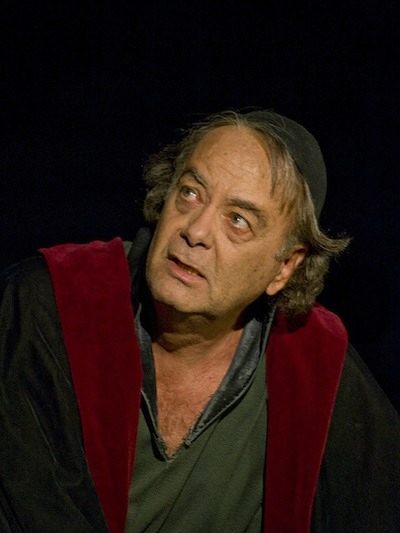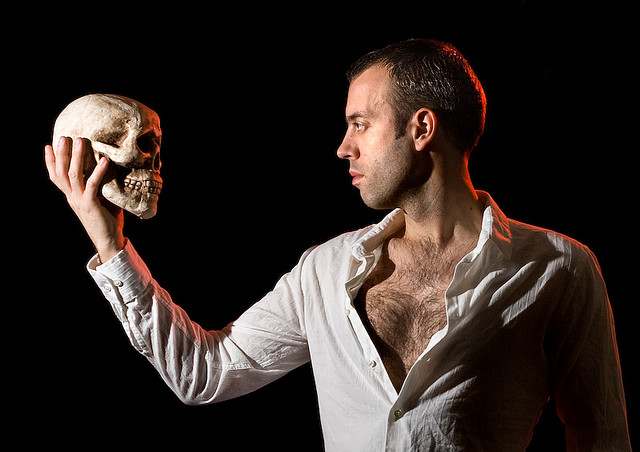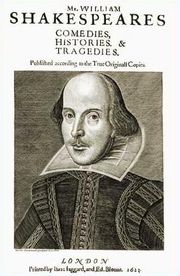 This week marks 450 years since William Shakespeare’s birth. This is the 2nd article in a series to honor the historic birthday of perhaps the greatest writer in the English language:
This week marks 450 years since William Shakespeare’s birth. This is the 2nd article in a series to honor the historic birthday of perhaps the greatest writer in the English language:
Shakespeare only wrote 37 plays, many of them comedies and histories, so I assumed it might be difficult to choose ten villainous characters. How wrong I was. I soon found it impossible to limit the list to 10, and even with a ‘Top 20’ I found other characters, bad to the bone, who didn’t make the cut.
What constitutes a villain? Certainly some people will be surprised and affronted to find Hamlet and Caliban on the list. I make no apologies, they do bad stuff – they’re in.
Villainy is represented here in many guises from the immature callousness of Richard II to the calculated machinations of Iago and Edmund. There are would-be seducers intent on assailing virtuous young maidens, tyrannical monarchs and more than one evil queen. Families seem to bring out the worst in people and there are malevolent sisters, brothers, stepbrothers, stepfathers and stepmothers all vying for position on this Shakespearean “most wanted” list.
So here, in order of increasing nastiness, are Shakespeare’s bad boys (and girls), along with quotable proof emanating from their own tongues…
20. Don John (Much Ado About Nothing) — The “Bastard Prince”, brother to Don Pedro. Don John is one of the few examples of a real villain in Shakespeare’s comedies. A sour man, he tries to thwart the wedding of Hero and Claudio out of a spirit of sheer perversity. Villainous quote: “I cannot be said to be a flattering honest man, it must not be denied but I am a plain-dealing villain.”
18. Angelo (Measure for Measure) — Left in charge of Vienna, Angelo enforces archaic laws including one demanding the death penalty for getting a woman pregnant outside of marriage. He appears pious and self-righteous but soon shows himself to be a total hypocrite when he tries to bribe a young novice, Isabella, to sleep with him in return for her brother’s life. Villainous quote: (Isabella, on Angelo’s abuse of his new-found power) “O! it is excellent to have a giant’s strength; but it is tyrannous to use it like a giant.”
17. Caliban (The Tempest) — Son of the witch Sycorax, a half-human monster and slave to Prospero. Another one that will probably get some people’s hackles up, Caliban is more often portrayed as a victim than a villain. However, don’t forget that he attempted to rape Miranda and willingly plots Prospero’s death with Stefano and Trinculo (who should probably also be on the hit list if space permitted). Villainous quote: (cursing Miranda and Prospero) “As wicked dew as e’er my mother brush’d with raven’s feather from unwholesome fen, drop on you both! a south-west blow on ye, and blister you all o’er!”
 16. Hamlet (Hamlet) – Prince of Denmark. Although Hamlet is ostensibly the tragic hero of the play, let’s not forget that he does some pretty dastardly things which qualify him for inclusion on this list: he sends his friends, Rosencrantz and Guildenstern, off to almost certain death, kills Polonius and spends much of the play plotting to kill Claudius. Villainous quote: (on stabbing Polonius) “How now! A rat? Dead, for a ducat, dead!”
16. Hamlet (Hamlet) – Prince of Denmark. Although Hamlet is ostensibly the tragic hero of the play, let’s not forget that he does some pretty dastardly things which qualify him for inclusion on this list: he sends his friends, Rosencrantz and Guildenstern, off to almost certain death, kills Polonius and spends much of the play plotting to kill Claudius. Villainous quote: (on stabbing Polonius) “How now! A rat? Dead, for a ducat, dead!”
15. Iachimo (Cymbeline) — A dishonest and lecherous sleaze. Iachimo enters into a pact to prove that Imogen can be seduced. When he fails in his seduction attempt, he resorts to theft and trickery to dishonour the lady. Along with Angelo, one of Shakespeare’s great lounge lizard would-be seducers. Interestingly, at the end of the play Iachimo remains unpunished. Villainous quote: “If you buy ladies’ flesh at a million a dram, you cannot preserve it from tainting.”
14. Claudius (Hamlet) – Hamlet’s stepfather, responsible for killing Hamlet’s father. He tries to send Hamlet off to almost certain death, when that fails he conspires with Laertes to poison hamlet with a poisoned sword. Villainous quote: “What if this cursed hand were thicker than itself with brother’s blood – Is there not rain enough in the sweet heavens to wash it white as snow?”
13. Cassius (Julius Caesar) — Leader of the conspirators against Julius Caesar who persuades Brutus to join the plot. Cassius seems to be motivated by a combination of ambition and political ideology. He eventually meets his end on the battlefield committing suicide after witnessing the death of his best friend Titinius. Villainous quote: (Julius Caesar describing Cassius) “Yon Cassius hath a lean and hungry look. He thinks too much. Such men are dangerous.”
12. Shylock (The Merchant of Venice) — A Jewish moneylender in Venice. Opinion is divided as to what extent Shylock is a villain or a victim. He certainly gets some pretty shabby treatment at the hands of the Christians but his insistence on wanting a pound of Antonio’s flesh makes it hard to see him in a totally sympathetic light. Though Shylock seems to dominate this play, he only appears in four scenes. Villainous quote: “The villainy you teach me I will execute, and it shall go hard but I will better the instruction.”
 11. Lady Macbeth (Macbeth) – Macbeths wife. Lady M’s ambitions for her husband result in her persuading him to stab not only Duncan but also his pages. Haunted by the murders, she eventually kills herself (offstage). Villainous quote: “Look like the innocent flower, but be the serpent under it.”
11. Lady Macbeth (Macbeth) – Macbeths wife. Lady M’s ambitions for her husband result in her persuading him to stab not only Duncan but also his pages. Haunted by the murders, she eventually kills herself (offstage). Villainous quote: “Look like the innocent flower, but be the serpent under it.”
10. Macbeth (Macbeth) — He begins the play as Thane of Glamis, but quickly murders his way to the top and becomes King of Scotland. However, his reign is short lived and he is soon beheaded in battle by Macduff. Critics argue over who is most villainous, Macbeth who commits the bloody acts, or his wife who goads himon. Villainous quote: “Stars, hide your fires! Let not light see my black and deep desires.”
9. Cornwall (King Lear) — Husband of Regan and a thoroughly nasty piece of work. Cornwall is a small role and is often overshadowed by some of the showier villains in the play. But don’t overlook him, he’s a ruthless torturer and deserves his place on the list. He eventually dies from a wound inflicted by one of his own servants during his torturing of Gloucester. Villainous quote: (on gouging out Gloucester’s eyes) ”Out, vile jelly! Where is thy lustre now?”
8. Richard III (Richard III ) — King of England for two years from 1483 to his death at the Battle of Bosworth Field in 1485. Shakespeare’s prototypical villain who begins to play with a long monologue explaining his villainous motivations to the audience. Richard will stop at nothing on his quest for the throne and relishes the chaos and carnage that he causes along the way. Richard III is the second longest play in the whole of the Shakespeare canon, only Hamlet is longer. Villainous quote: (on courting Lady Anne) “Was ever woman in this humour woo’d? Was ever woman in this humour won? I’ll have her; – but I will not keep her long.”
7. Tamora (Titus Andronicus) — Queen of the Goths, brought to Rome as a captive by Titus. Though in some ways it is tempting to see Tamora as the archetypal wicked Queen, you have to remember that she has had some pretty rough treatment at the hands of the Romans. In one of the most bizarre scenes in Shakespeare, she eats her own two sons baked in a pie by Titus before he subsequently stabs her. Villainous quote: “I’ll find a day to massacre them all, and raze their faction and their family.”
5. Goneril (King Lear) — Lear’s eldest daughter, she receives a third of his kingdom but can’t cope with her father and his rowdy entourage. Married to a weak husband, she publicly flaunts her affair with Edmund. She eventually stabs herself (offstage) after confessing to poisoning her sister. Villainous quote: (Albany, speaking of his wife) “O Goneril! You are not worth the dust which the rude wind blows in your face. I fear your disposition: That nature, which contemns its origin, cannot be border’d certain in itself.”{jumi [*8]}
4. The Queen (Cymbeline) — Cymbeline’s wife and Imogen’s stepmother. Here’s a good prototype for an evil stepmother, she tries unsuccessfully to poison both Imogen and Cymbeline. Even though she is never given a name, the Queen is a substantial villainous role. Villainous quote: (Dr Cornelius, who has been asked to prepare deadly poisons by the queen who says she only wants to poison animals to see what happens!) “I do not like her. She doth think she has strange ling’ring poisons. I do know her spirit, and will not trust one of her malice with a drug of such damn’d nature.”
 3. Edmund (King Lear) — Gloucester’s illegitimate son. He concocts a plot to have his half brother banished and has affairs with two of Lear’s daughters playing them off against each other for his own ends. Edmund is not without his redeeming qualities and at the end of the play, after he has been mortally wounded, he repents his evil deeds — however, it is all to no avail, no one’s life is saved by revelations and many directors nowadays cut his repentance speech completely. Villainous quote: “Now, gods, stand up for bastards!”
3. Edmund (King Lear) — Gloucester’s illegitimate son. He concocts a plot to have his half brother banished and has affairs with two of Lear’s daughters playing them off against each other for his own ends. Edmund is not without his redeeming qualities and at the end of the play, after he has been mortally wounded, he repents his evil deeds — however, it is all to no avail, no one’s life is saved by revelations and many directors nowadays cut his repentance speech completely. Villainous quote: “Now, gods, stand up for bastards!”
2. Aaron (Titus Andronicus) — Tamora’s Moorish lover brought by Titus as a captive to Rome. One of Shakespeare’s darkest villains who is responsible for many of the atrocities and murders in this very bloody play. When he is finally captured he gloats over his villainous deeds. Shakespeare only gives Aaron one redeeming quality, his devotion to his baby son. Villainous quote: “I have done a thousand dreadful things as willingly as one would kill a fly; And nothing grieves me heartily indeed, but that I cannot do ten thousand more.”
1. Iago (Othello) – Othello’s lieutenant and the man who engineers his downfall by persuading Othello that his wife is having an affair. Iago is an arch manipulator who is responsible directly or indirectly for all the deaths in the play. Interestingly, Iago is one of the few major villains who does not die at the end of the play. Villainous quote: “But I will wear my heart upon my sleeve for daws to peck at. I am not what I am.” (Editor’s note: A daw is a Eurasian bird in the crow family noted for thievery.)
 Gary Dooley is an academic, teacher and author with an international reputation. He has a PhD from Cambridge University (UK) and has worked extensively in the UK, Australia and United States. As a director, his productions of classic plays including King Lear, Othello, Measure for Measure, The Merry Wives of Windsor and The Servant of Two Masters have been widely acclaimed. Purchase his Monologue books for male and female actors on Amazon: Great Classical Monologues for Young Actors
Gary Dooley is an academic, teacher and author with an international reputation. He has a PhD from Cambridge University (UK) and has worked extensively in the UK, Australia and United States. As a director, his productions of classic plays including King Lear, Othello, Measure for Measure, The Merry Wives of Windsor and The Servant of Two Masters have been widely acclaimed. Purchase his Monologue books for male and female actors on Amazon: Great Classical Monologues for Young Actors.
Photo credit: (Top) Shylock, by John Georgiou, CC license, Flickr – (left, top) Hamlet, by Flickr user, placbo, CC (left, bottom) Southwark Cathedral, London- Emily Barney, CC license



















